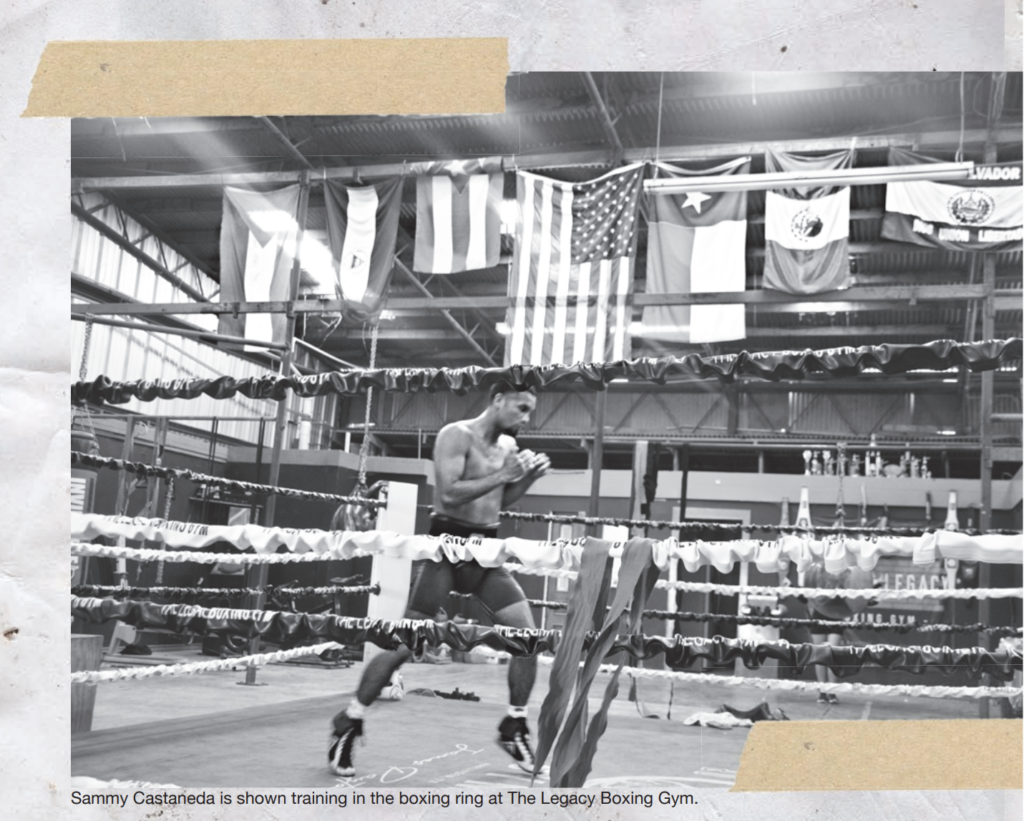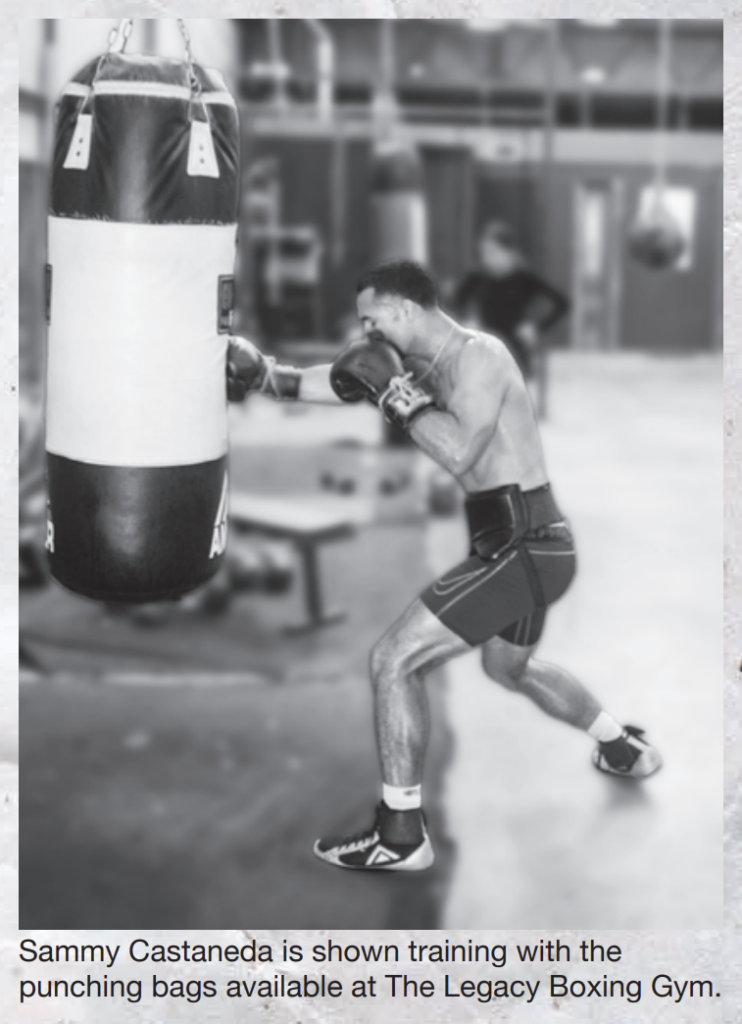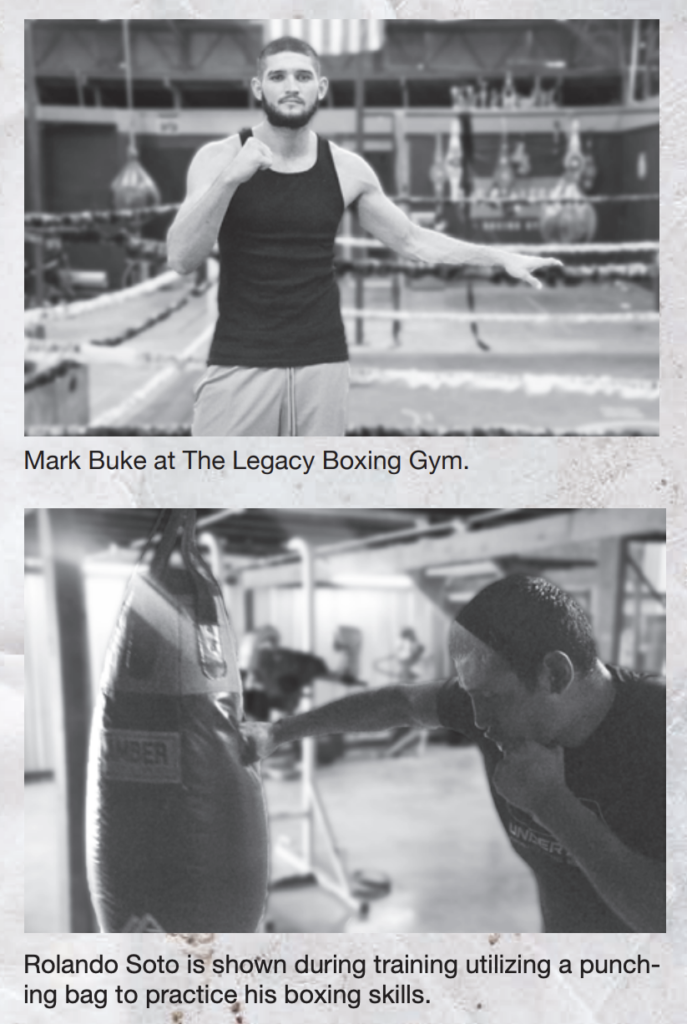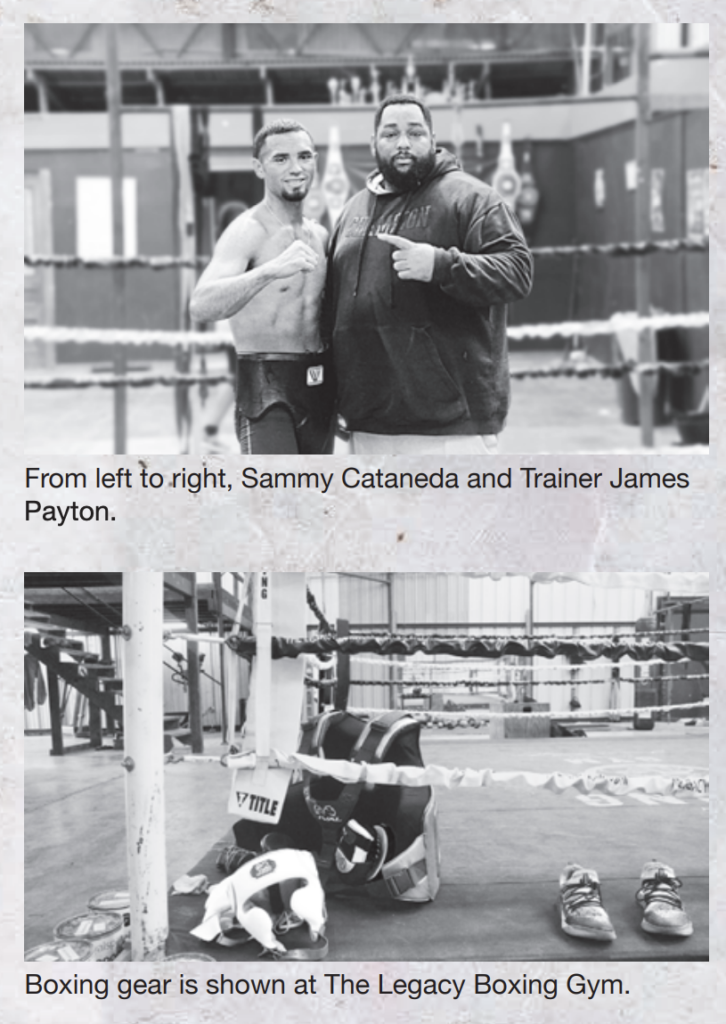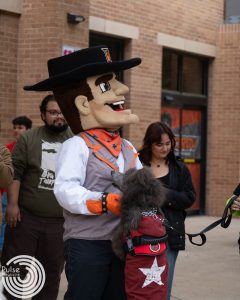Forming a Legacy in The Rio Grande Valley
The red building and its name on a large green banner are visible from the side of the road as you drive through one of the most impoverished regions in Texas. It is a boxing gym.
When you enter the building, your eyes are instantly drawn to a squared circle glowing in the heart of the building, bathed in bright lights. When you look at the ceiling, seven national flags wave above the boxing ring, representing the sport’s diversity.
Welcome to The Legacy Boxing Gym, owned by trainer James Payton at 1961 N. 77 Sunshine Strip in Harlingen, Texas.
According to Payton, the Legacy Gym is a place to impact the lives of others and make a difference. The former amateur boxer said he fell in love with training and found his calling at 18. He is originally from Las Vegas and has worked with Mexican-American boxers Eric Molina and Roberto Garcia, a former boxer turned trainer.
Payton said his passion for boxing and working with other trainers motivated him to open his gym to influence the community’s youth to join the sport, steer them away from a life of crime, and help them overcome personal issues.
“I opened my gym to take kids off the streets,” Payton said. “I want to give them another outlet and sense of structure. Everybody in this gym isn’t going to be a professional boxer. That’s proven. Everyone in this gym will improve mentally, physically, and emotionally because boxing is therapeutic. And a lot of the kids that come here, their parents think that they have issues like anger problems. They just need somebody to help them find who they are. That’s what The Legacy Boxing Gym is all about.”
Payton also has a fascinating history. When he was 9, he spent much time with Dock Broaddus, a trainer who discovered world heavyweight champion George Foreman. Payton also trained with Mike Tyson and the Mayweather family at the Golden Gloves Gym in Las Vegas. He said he quickly understood the difference between talent and hard work due to years of being surrounded by outstanding people.
Payton added that some boxers show little talent but are hard workers who later become the best. “Hard work beats natural talent 10 times out of 10,” he said. “I go for the guys that work hard because the guy that works hard, you can mold him into anything.”
Those who enter the boxing gym and see the fighters sweating in the stifling heat will witness the boxers’ hard training. Payton said he knows that his boxers are dedicated. Therefore, he is ready to train his team and keeps the gym open seven days a week.
Payton also said he puts in much hard work. For the trainer, there are no days off. If a boxer wants to do more work, they call him to open the gym. Payton said it is not a boxer’s physical state but his mindset that determines whether he is ready to go from amateur to professional.
“Every boxer’s time is different,” Payton said. “Every fighter doesn’t progress the same. Some progress faster than others based on their love for the sport. Some people fall in love with it later, and some fall in love with it earlier, and when they do fall in love with it, they just continue to grind and grow and step by step. They get better with the experience and sparring.”
Although the Valley is more famous for its high poverty rates and Mexican culture than for producing world boxing champions, Payton said he feels the region is home to many undiscovered gems.
“The Rio Grande Valley can definitely be important in boxing in the United States of America because it’s a small area with a lot of talent,” Payton said. “People don’t realize how much talent is here. I have a lot of talent in this gym.” How does he find the best boxers?
“The best boxers come from the dirt,” Payton said. “They don’t have an outlet; they don’t have rich parents; they don’t have 401K. They don’t have insurance. They don’t have unlimited funds or unlimited food. A lot of them don’t have transportation. They fall in love with boxing because they don’t have anything else. They have nothing else. The best fighters come from the streets. The best fighters come from poverty-stricken places.”
For example, three of his best boxers faced different obstacles, such as financial struggles and mental illness, that led them to The Legacy Boxing Gym. They are now local champions who share a common dream: to win a world championship. Meet 28-year-old welterweight Mark Beuke from Corpus Christi, Texas. 26-year-old WBC Fecarbox Bridgerweight champion Rolando Soto from Olmito, and 24-year-old super lightweight Sammy Castaneda from Weslaco. These three polished their skills with each thudding blow on the boxing equipment while Payton coordinated their daily routines.
Beuke said everybody in his hometown of Corpus Christi knows how popular boxing is in the Rio Grande Valley. Castaneda agreed, “There’s a lot of talent down here.”
Casteneda said, “It is a bit difficult to get noticed down here, though. It’s a little place. It’s not like San Antonio, Houston, where boxers get more spotlight. That’s one of the reasons I first got out. I was given no chance unless I moved to California or any of those cities. But once I overcame my issues, I put in the work, and now the results are showing. Now I have great advisors guiding my career toward my dream.”
Castaneda has been boxing since he was 8 years old and descended from a line of boxers. He said he asked his father to take him to a boxing gym at that age, despite his father’s objection and people’s opinions.
“Some people call me crazy,” Castaneda said. “When I get in the ring, I’m ready for war. It’s either me or you at the end of the day. We’re modern gladiators. I get in there to fight and hurt, just like they’re trying to hurt me. For me, I’m willing to go all in for this. If something happens to me in the sport…I just did my best. What’s important is not the destination but the journey. I train every day. Twice a day when I’m off of work.”
Castaneda also said he picked boxing above other sports because he is a fighter inside and outside the ring. He shared that his greatest challenge was overcoming mental health issues and returning to boxing where he is unbeaten. Heavyweight champion Tyson Fury, who has had mental problems, inspired him, and he said he owed his return to Fury.
However, boxing and world championships are not their only inspirations and obligations. They also focus on financial stability to provide a better future for their families. The boxers said each fight pays between $800 to $2,000 and requires many weeks of training.
Also, a fighter’s pay depends on which promoter signs them and who they fight. If a boxer withdraws from a fight at the last minute and their opponent is well-known, the payout for the substitute fighter increases. Therefore a fighter must have a second job or own a small business to make ends meet at the beginning of their career.
“My wife and I own KS White Castle Co.,” Soto said. “We rent party and wedding supplies. Boxing may be challenging to balance with two kids. It is harder without financial stability. Beginning boxers struggle financially and it’s difficult to afford to pay rent. The Valley’s declining economy makes things harder. Everything’s so expensive.”
Castaneda also works part-time with HEB. He has a busy daily schedule and is making sacrifices to provide a better life for his daughter.
Boxing is also a brutal sport. According to Other Sports website, since 2000, 33 boxers have died globally from boxing injuries. At Legacy, a fighter visits the hospital for examination after a fight to ensure no severe injuries.
Nevertheless, many people practice the sport because it is “a poor man’s sport,” according to Payton. For each of his fighters, becoming a world champion is the only ticket out of poverty and the Valley. One fight may change their lives and put them in a different social class. Therefore, they must undergo punishment, which takes a physical toll over time. May suffer lifelong injuries that prevent them from getting regular jobs after they stop boxing.
Soto explained that he understood boxing’s dangers and the mortal risks fighters take whenever they enter the ring. Beuke, like Soto, also said he recognized the same risks and dangers and the anxiety they instill in their families. “My family loves it and hates it,” Beuke said. “They don’t like seeing me get punched, but it’s a business, and it’s my job,” Castaneda said. He, too, is aware of the stress and hazards the violent sport poses to his family.
“My girlfriend saw me for the first time in my last fight. She was scared when I got hit. But she likes it and supports me. But this is my only way out. I tell my girlfriend, ‘Don’t worry, I’m going to make it. I’m going to be world champion.’ I’m just thankful for her, thankful for my family, thankful for my baby girl, for making me more responsible and more hungry.”
However, getting hurt or killed is not the only challenge the boxers face. For Beuke, who started boxing at 15 and is a first-generation boxer, the most significant challenge is maintaining the proper weight and ensuring that they continue to do the right things,” such as eating correctly and not staying up too late.
Boxers also cannot expect to do all their work in the gym and must continue to work outside the gym, even during their free time. The trio said that professionals often sacrifice going out with their friends, partying late, spending time with their families and sticking to a strict diet to succeed because their discipline outside the ring transfers to the emotions they take into the ring.
“Boxers get up really early in the morning,” Beuke said. “We sometimes work out twice a day, once in the morning and once at night. It teaches you a lot, especially how to control your emotions, and it humbles you. You learn how to control your nerves. I can’t get too angry in the ring because if I lose control it may cost me the fight. It teaches you a lot about life, yourself as a person, and if you have that grid and determination to succeed.”
These challenges, according to Castaneda, should not stop anyone from boxing. For those who are facing mental health issues, he shared some advice.
“If anybody out there is going through things, facing demons in their head, just don’t worry. Keep your head up, wake up, get out of that. Try to beat it and achieve whatever you want. I was there too, and it can be done. You were meant to be something special; you may not know what it is, but you are meant to be something special.”
Payton and the fighters also said they understand their dreams can be shattered with a single blow, sending them back to the beginning when the ten-count bell rings. They know that their careers may be long or short, leaving them with permanent injuries that also impact their families.
Nevertheless, their thirst for a better life encourages their spirit to pursue greatness. Payton said the Rio Grande Valley is the place for unearthing great talent and establishing a legacy.

